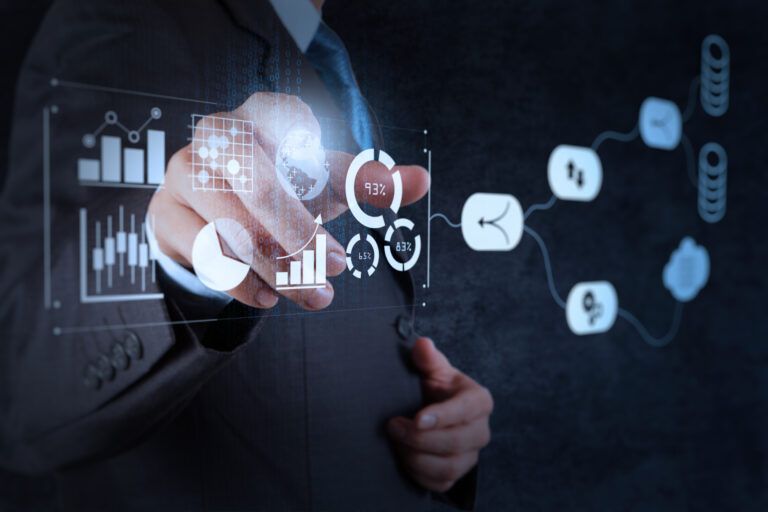Difference Between Big Data and Data Analytics

An emerging trend of modern solutions companies seeking to solve their business problem has led to the increased use of data science, analytics, big data, machine learning, and similar modern applications. More than automation, these processes help in boosting business success and reduce operation costs effectively. So, in this article, we will look at two modern applications, namely, big data and data analytics, that have been driving growth and innovation in businesses.
Big Data vs Data Analytics: What Sets Them Apart?
Businesses are believed to be prioritizing big data and data analytics in their corporate agenda. Together, they both promise to transform the business into a profitable venture. They are automating processes and inducing innovation and efficiency in the organization.
Business leaders are looking at novel ways to integrate and implement data and analytics into their companies. However, before implementing these modern processes, it is imperative to understand the fundamental facets we will explore in the succeeding part of the article.
What is Big Data?
Experts define big data as a phenomenon with the three Vs- variety, volume, and velocity. Big data is simply larger, complex, and voluminous data. These data sets are generated with great velocity in a business organization and massive volume, making it tough to use traditional data segregation and analytic techniques to draw insights from them.
Businesses use modern data science techniques like artificial intelligence, machine learning, and deep learning to deal with the big data a company generates regularly. Using scientific methods makes data extraction and segregation effective and error-free.
What are Data Analytics?
Data analytics is a scientific process that uses mathematical formulas and scientific methods to draw insights from data collected through data science applications like artificial intelligence, machine learning, and deep learning. Businesses can use insights derived from data analytics to drive change and innovation. Interestingly these insights can also help assert key performance indicators (KPI) or metrics to evaluate the performance of the company and its products or services.
Therefore, in this digital era, a negligible amount of business firms is unaware and devoid of big data and analytics. Therefore, we will draw a clear difference between big data and data analytics to simplify the process of understanding these two concepts and implementing them into business. But before that let’s look at the application of big data and data analytics.
Understanding the Application of Big Data
Here are some areas where big data can be applied to gain automation and effectiveness:
• Financial services
Insurance, bank, and other financial institutions can use big data to ignite efficiency and automation in various financial services. Moreover, they can use big data to segregate and gain meaningful insights from multi-layered and multi-structured data in the finance sector. In addition, big data can be a faithful aid while conducting customer, fraud, and operational analytics.
• Communications
Big data can be used to gain new audiences, retain old users, and expand the customer base in the communication industry. In addition, through its innovative and modern tools and techniques, big data promises to offer a solution to some of the operational challenges faced by the industry.
• Retail
Big data has made inroads into the retail industry by providing them with comprehensive, self-performing, and automatic business processes that help serve the customer better. Furthermore, providing innovative methods to analyze a plethora of data- including web pages and social media comments, among others- will help companies better understand their target audience and make personalized and significant marketing and promotion plans.
Understanding the Application of Data Analytics
After understanding the growing importance and application of big data in business, it’s imperative to look at how analytics transforms different sectors. Therefore, here’s how the application of data analytics brings innovation to different industries:
• Healthcare
Data science applications like machine learning, artificial intelligence, and analytics are transforming the healthcare industry. They are believed to bring efficiency in administrative functions like patient flow management, recording and managing treatments, and hospital equipment. In addition, it automatizes the employee management systems.
• Gaming
Analytics plays a crucial role in the gaming industry. It helps gaming companies evaluate the time spent playing the game and draw deep and engaging insights about the customers, which helps in realizing their likes and dislikes. Moreover, it helps in optimizing the games.
• Tourism
Data analytics can help the tourism sector by analyzing the likes and dislikes of the customers visiting their website or social media page. It deploys analytical tools to understand the audience’s requirements, increasing customer satisfaction.
Now that you have understood the basics of data analytics and big data. Let’s see how these two modern business processes are different from each other.
What’s the Difference Between Big Data And Data Analytics?
Here are some points that highlight the difference between big data and data analytics:
1. Tools used in Big Data Vs Data Analytics
Since big data is a more comprehensive and extensive process, its tools are complex and sophisticated. Tools such as automation and parallel computing tools are used to convert unstructured data into meaningful data sets.
Meanwhile, simple tools like statistical modelling and predictive modelling are used in data analytics. Moreover, many statistical and mathematical formulas are used while analyzing and interpreting data.
2. Types of Industries using Big Data and Data Analytics
Many industries are accommodating modern scientific processes like data science, big data, and data analytics to incite growth and innovation. Service industries like tourism, healthcare, and information technology (IT) use data analytics to transform and improve their administration. For instance, hospitals use analytics to bring efficiency to their administrative functions like patient management, treatment and equipment management, etc.
However, big data is used in banking, retail, and similar industries that directly communicate with data. Customer-oriented industries use big data mainly because modern technology instils a systematic process tracking customer demand and requirements and helps discover often neglected patterns.
3. Type of Data in Big Data Vs Data Analytics
In big data, one will find unstructured and raw data. The main aim of big data is to convert the raw data into meaningful data sets that can then be used for drawing meaningful insights or solving complex business problems.
Meanwhile, data analytics is mostly structured data. It analyses the structured data to answer complex business queries, find solutions to business challenges, etc.
Starting a Career in Data Science and Analytics
Most employers are looking for candidates with an advanced degree in data science analytics or a similar field. Therefore, if you plan to develop a career in data science and analytics, enrol in Emeritus India’s certification courses. In addition, we have partnered with renowned Indian universities to design special and personalized data science and data analytics courses for newcomers and working professionals.



